Trans sex workers share powerful reasons why sex industry needs to be decriminalised
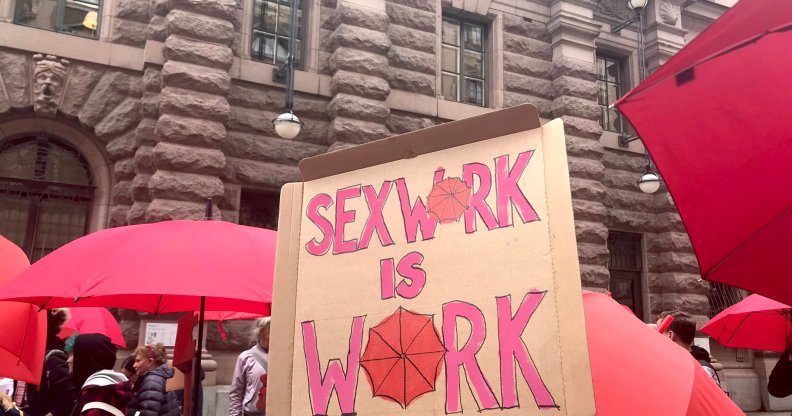
Hundreds marched in Stockholm on Sunday in support of sex workers’ rights. (Twitter/SWARM)
For the first time, hundreds of sex workers marched through the streets of Stockholm calling for sex workers’ rights and the decriminalisation of the sex industry.
The sex workers’ rights protestors demanded that the government end the “harmful”, “unjust” and “stigmatising” criminalisation of sex work.
At the September 29 protest, activists urged the government to listen to their condemnation of the Swedish model – the sex-work law that criminalises sex workers’ clients and is broadly opposed by sex-worker organisations globally.
Trans sex workers told PinkNews how the lethal combination of transphobic discrimination and the criminalisation of sex work puts their safety and survival on the line.
“Transgender people and queer people in general in Norway are still stigmatised and discriminated against to begin with,” says Lilith, from Norwegian sex workers organisation PION. “So we are as a community are often overrepresented in the sex industry.”
We are seen as the parasites, the monsters that the world needs to abolish.
“When the Swedish law criminalises our clients, it also creates this notion that we are a criminal enterprise. Yes, it only criminalises clients, but it creates this illusion that the whole sex industry is criminal. As such, we are seen as the parasites, the monsters that the world needs to abolish,” she says.
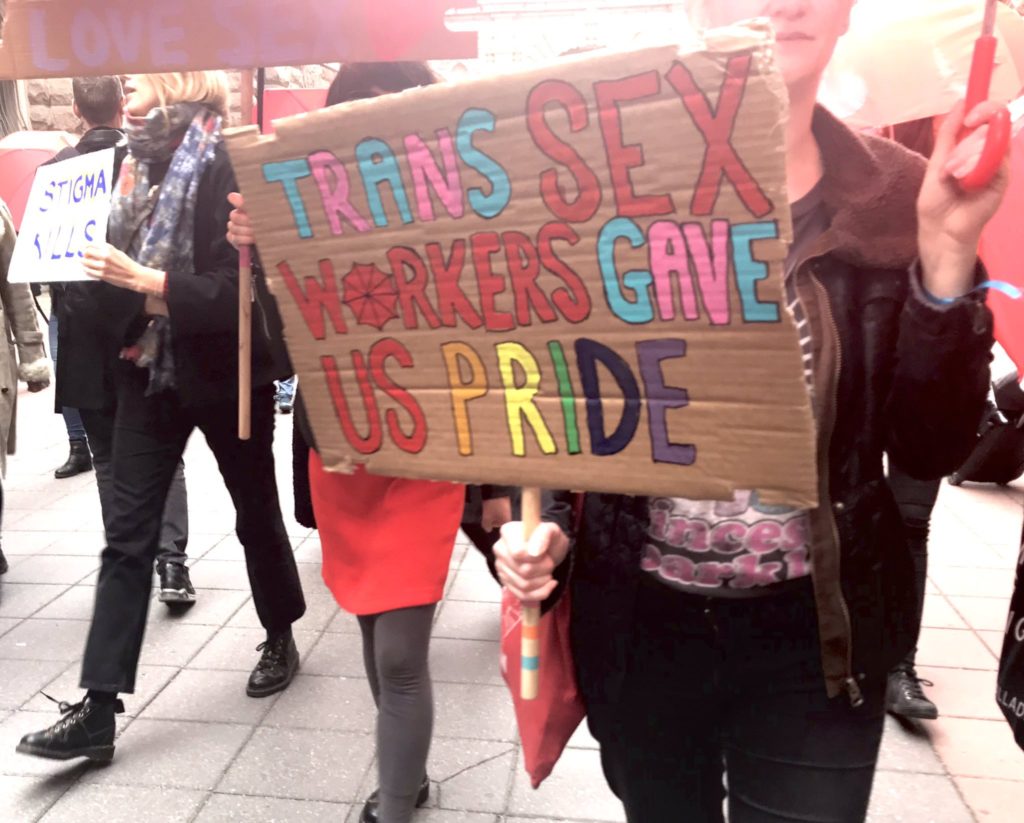
Placard at the march in Stockholm. (Twitter/SWARM)
Sex worker rights are human rights.
The Swedish – also called Nordic – model, which makes it illegal to buy sex, was hailed as progressive by feminist organisations when it was introduced in 1999. Versions of the law have since been introduced in other countries including Norway, Iceland, Ireland and Canada.
In 2016, Amnesty International said sex work has to be decriminalised worldwide, because the current models of partial criminalisation prevent the “realisation of the human rights of sex workers“.
Criminalisation impacts trans sex workers twofold, Dinah, from Trans United Netherlands, told PinkNews.
“Decriminalisation for trans sex workers is very important because we are already discriminated [against] and actually criminalised as trans people, we are very much on the forefront of being visible in society and then the only way that we can do work, many times, is sex work,” she says.
There is a double criminalisation – one on being LGBTIQ and one on being a sex worker.
“Criminalisation of sex work means that there is a double criminalisation, in fact. One on being LGBTIQ and one on being a sex worker.”
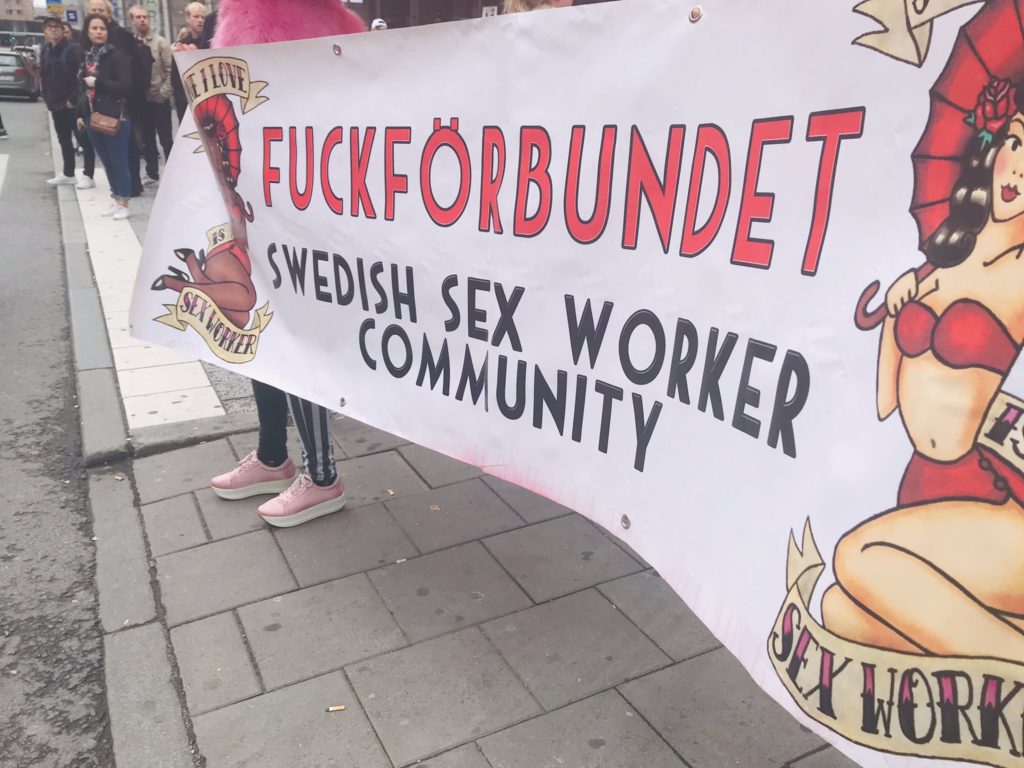
The protest in Stockholm was organised by sex-worker organisation Fuckförbundet. (Twitter/SWARM)
Trans sex workers vital to gay rights movement.
Red Canary Song is a New York-based, migrant sex-worker grassroots organisation that fights for justice and police accountability, after the death of Chinese massage worker, Yang Song, during a police raid in Flushing in November 2017.
The organisation’s director, Kate Zen, says that US anti-trafficking laws similar to the Swedish model increase policing of sex workers and “primarily harm migrants, trans, and street-based sex workers, while doing little to actually reduce the factors driving trafficking: poverty, migration laws, lack of adequate and accessible housing and healthcare”.
“Migrant, black, brown, and trans sex workers are overrepresented in police arrests, and report rampant police violence, including sexual violence,” she says. “Ironically, these are also the groups of people that pro-police/anti-prostitution organisations say they want to help. Their help is clearly misdirected, and actually harming the very people who are most vulnerable in society.”
The leaders of LGBTQ movements in NYC during the Stonewall Rebellion were trans sex workers of colour.
“More than 50% of sex workers in the US say that they have turned to sex work in order to survive, pay for medical procedures, due to employment discrimination in other jobs. LGBTQ people are overrepresented in the sex industry, and the leaders of LGBTQ movements in NYC during the Stonewall Rebellion were trans sex workers of colour – Sylvia Rivera and Marsha P Johnson,” Kate says.
New York was the first US state to introduce a bill proposing to decriminalise sex work, in June 2019 – the same month that Layleen Polanco, an Afro-Latina trans sex worker, died in solitary confinement in Rikers Island jail after being convicted for prostitution charges.
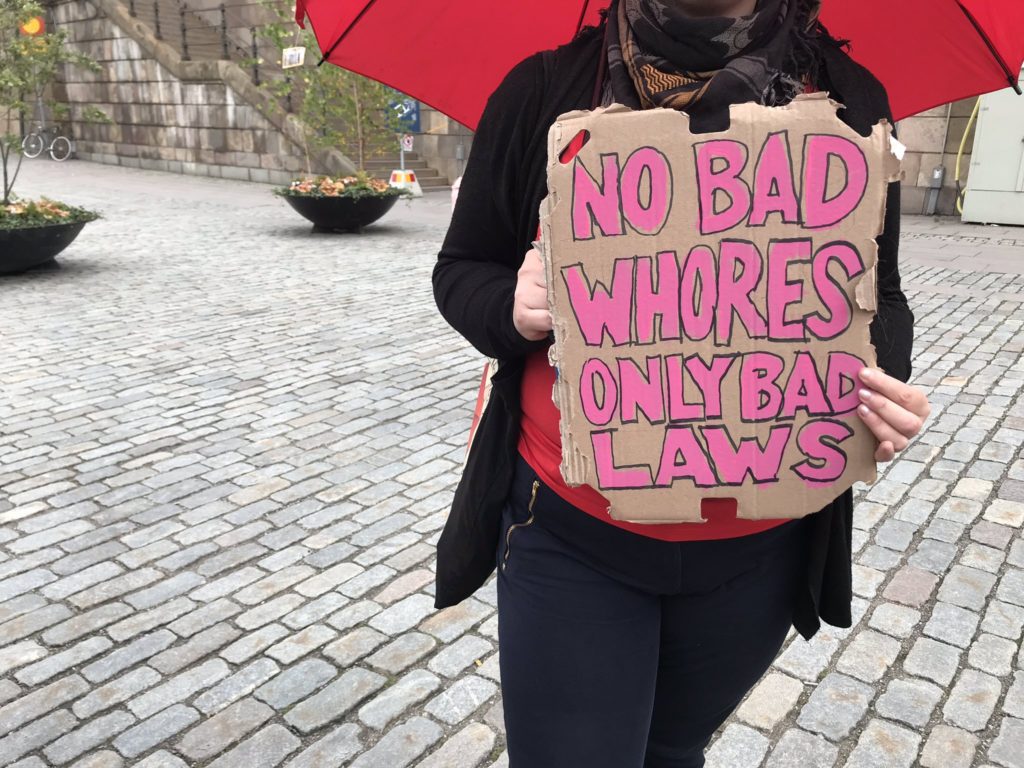
“No bad whores, only bad laws.” (Twitter/SWARM)
The New Zealand model.
Dozens of sex worker organisations went to the protest in Stockholm on Sunday.
Henna, from sex-worker led activist organisation FTS Finland, says that Finnish sex workers went to the protest in solidarity with their Swedish colleagues “as well as any other colleague who is affected by the Swedish model”.
Listen to us, please!
“Be that trans sex workers or cis, both are affected by this model which doesn’t hear what the sex workers are saying. Listen to us, please!” she says.
Only one country in the world has listened to sex workers and decriminalised sex work – New Zealand.
The New Zealand model aims to uphold the human rights of sex workers and to decriminalise sex work. It was introduced in 2003.
While New Zealand’s approach appears to be moving towards ensuring safety for sex workers, other countries appear to be moving backwards.
Mimi, a trans migrant sex worker from French sex-work union STRASS, told PinkNews that laws criminalising clients – introduced in France in 2016 – are negatively affecting many trans sex workers.
“Especially those who are trans migrant sex workers, who face a lot of discrimination, especially when they are undocumented and working on the streets. Many of them face more insecurity, especially more aggression and more violence.
“More physical violence and any kind of attack, because right now, trans migrant sex workers need to isolate themselves in order to hide their clients from the police, and this is the reason, this is why they are more exposed to violence than before, because they are afraid that their clients will be arrested.
“This, and the fact that there are fewer clients, is a direct result of the criminalisation of the clients.”
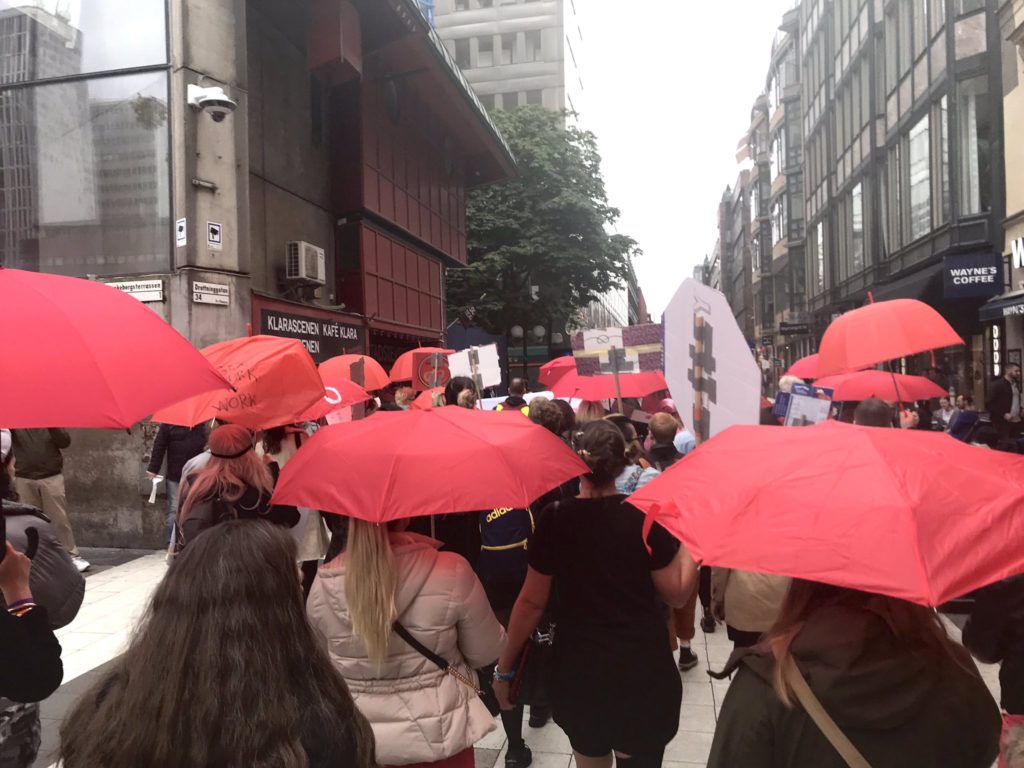
Red umbrellas – the worldwide symbol of the sex workers’ rights movement – at the Stockholm march. (Twitter/SWARM)
Criminalisation increases police violence against sex workers.
Police violence as a result of the criminalisation of clients is also being experienced by sex workers in Ireland, according to Adi, from the Sex Workers Alliance Ireland.
Ireland brought in laws making it illegal to buy sex in 2017, but has only seen two clients prosecuted since then – while in that time “we’ve seen a 92 percent increase in violent crime against sex workers”, she says.
“In Ireland, and elsewhere, it’s impossible to find employment in any other field other than sex work – I’ve tried, over and over again, to find other types of work, but nobody’s willing to hire you,” Adi says. “And then in sex work, you’re constantly facing Gardaí harassment, which in my case resulted in my eviction from the premises in which I was working.”
LGBT+ people are overrepresented in the sex-work industry.
The widespread impacts of the criminalisation of sex work have catalysed the sex workers’ rights movement around the world. Luca Stevenson, coordinator at the International Committee on the Rights of Sex Workers in Europe (ICRSE), says ICSRE also joined the Stockholm protest “in support of decriminalisation of sex work”.
Many LGBTI people sell sexual services to survive.
“Most LGBTI organisations around the world – Transgender Europe, ILGA Europe, ILGA World – are supporting the decriminalisation of sex work. We know that many LGBTI people sell sexual services to live, to survive,” he says.
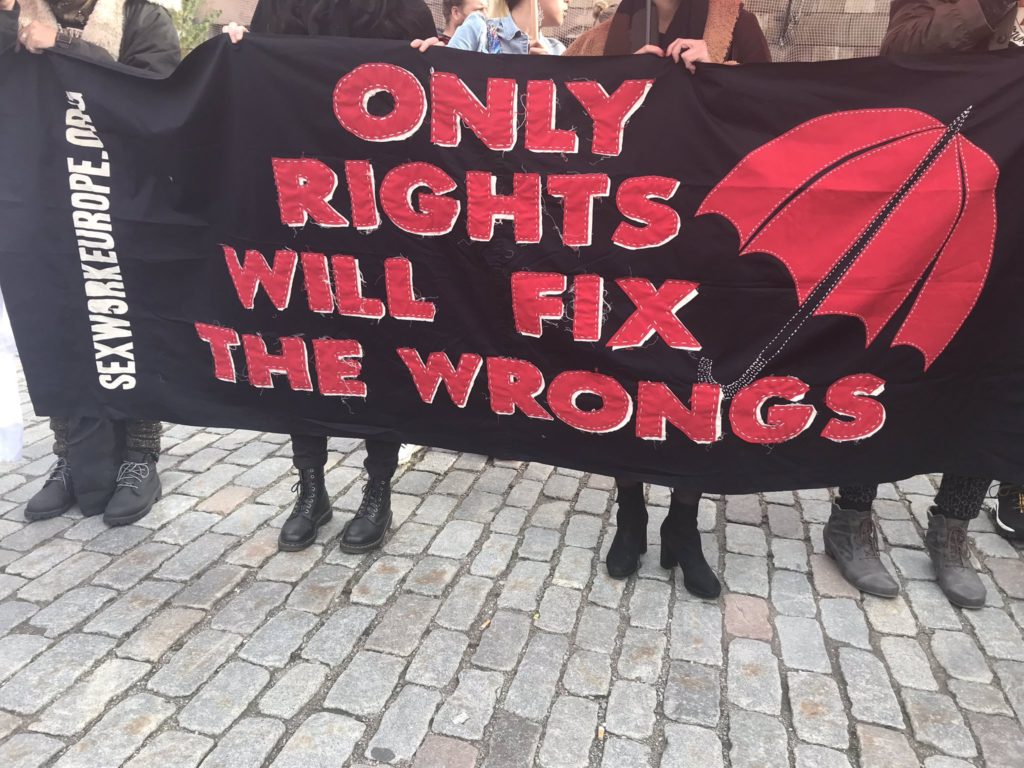
The sex workers’ rights movement wants sex work to be decriminalised globally. (Twitter/SWARM)
“Under the Swedish model they are still directly targeted by the police, the criminalisation of clients means less clients, means people have to take greater risks accepting services they were refusing before, accepting sex without condoms in order to make a living, and we see that this has a really negative impact on LGBTI sex workers,” Luca says.
“We hope that after 20 years of the Swedish model, without any evidence of success, the law will finally be repealed in countries with the model,” Luca says.
Feminists who call for the Nordic model are harming trans sex workers.
The need for decriminalisation can be seen in the harm caused to queer and trans sex workers by the current model, Lilith tells PinkNews.
Sex work is the last safety net that actually catches us.
“We are extra heavily criminalised, after being perhaps kicked out of our homes, thrown out by our families, falling through the holes of a very unjust system that is not helping transgender people at all,” she says.
“We have fallen through all of these holes and safety nets that are supposed to catch us, and sex work is the last safety net that actually catches us, that allows us to make a living and survive. What the feminist and abolitionist movement is doing by introducing these laws [the Swedish model] is actually setting fire to these safety nets.”

